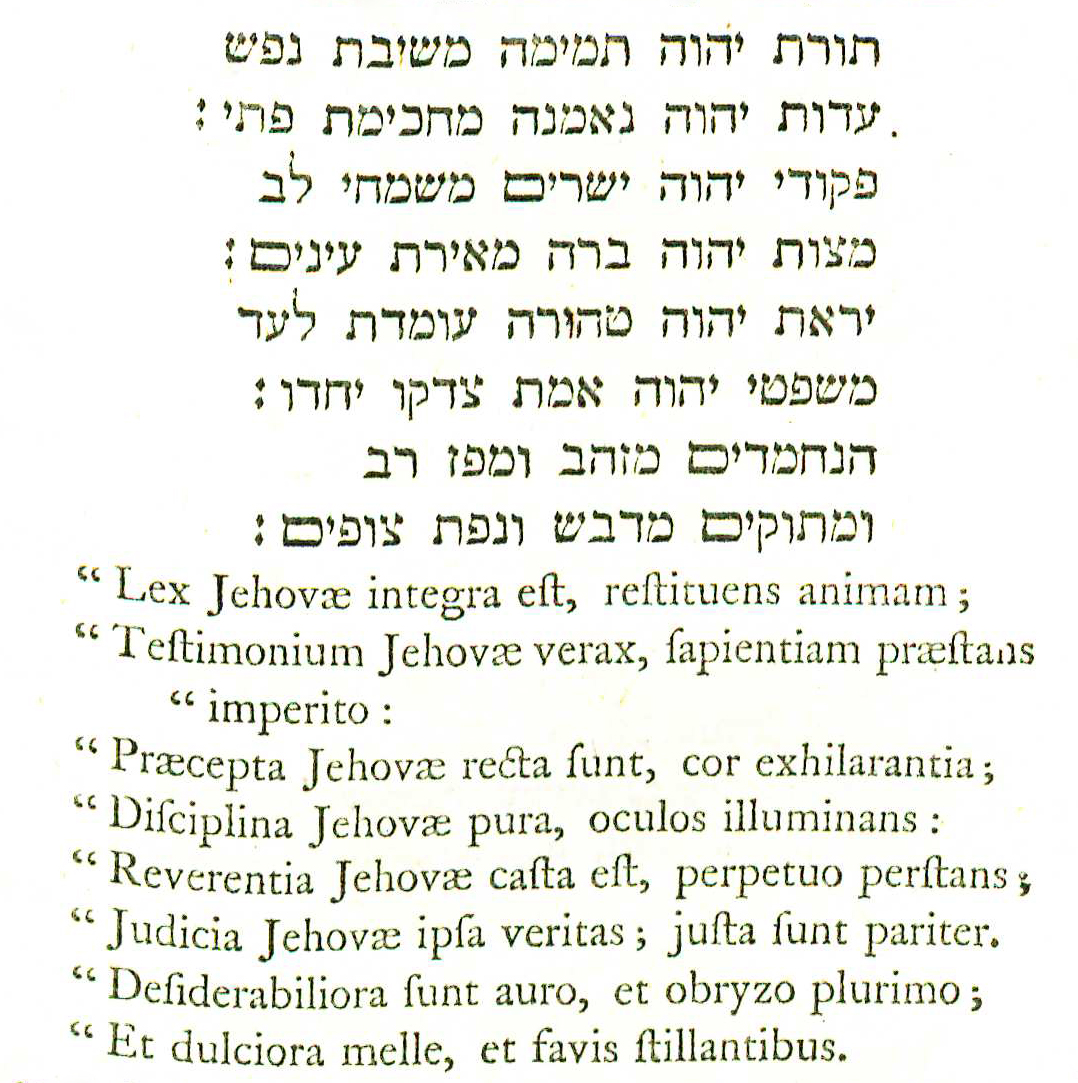De Sacra Poesi Hebræorum: Prælectiones Academiæ Oxonii Habitæ
by Robert Lowth
| De Sacra Poesi Hebræorum | |
|
Title page from De Sacra Poesi Hebræorum, George Wythe Collection, Wolf Law Library, College of William & Mary. | |
| Author | Robert Lowth |
| Published | Oxonii: e typographeo Clarendoniano |
| Date | 1763 |
| Edition | Other edition, with additions |
| Language | Latin, Greek, and Hebrew |
| Pages | [7], 507, [13] |
| Desc. | 8vo (22 cm.) |
| Location | Shelf B-1 |
Robert Lowth (1710-1787) was born in Winchester, England. He attended Winchester College and St. John’s College in Oxford, and was admitted as a scholar at New College before becoming a fellow. Lowth gained recognition for his poems in both English and Latin very early in life. In 1741, he was elected a professor of poetry at Oxford, and served for ten years. He focused on religious poetry, looking into “divinely inspired” Hebrew verses and creating new methods for reading and understanding the religious passages of verse.[1]

Ordained in 1742, Lowth served as a priest and a chaplain before being appointed a royal chaplain in 1757. In 1766, he was consecrated as Bishop of St. David’s before being nominated and confirmed as Bishop of London.[3] Lowth later declined to accept the position of Archbishop of Canterbury.[4] Lowth preached frequently, often on the need for godly administration within the church. As bishop, he was known for his eradication of “abuses of the clergy in political and financial matters.”[5]
Lowth's De Sacra Poesi Hebræorum derived from his lectures at Oxford. First published in 1753, the work helped "to expand and define the canon of biblical poetry."[6] In it,
"Lowth urged the importance of setting biblical poetry in the context of oriental rather than classical style and the impossibility of ever determining the ancient vocalization of the Hebrew Bible with sufficient accuracy to identify its true metrical structure. In place of metre Lowth argued that the structure of Hebrew verse could be identified by its often parabolic or figurative mode of expression, and in particular by the parallelisms, or repetitions of similar words or phrases, sometimes in a regular order, sometimes not, that gave rhythm to Hebrew poetry and song, and served almost as an alternative to metre. Using these critical tools Lowth also tried to identify a sublime, and divinely inspired, quality in Hebrew verse."[7]
Evidence for Inclusion in Wythe's Library
Thomas Jefferson listed "Lowth de Poesi Hebraeorum. 8vo" in his inventory of Wythe's Library, noting that he kept the volume himself. He later sold a copy to the Library of Congress but it no longer exists to verify the edition or Wythe's previous ownership. Brown's Bibliography[8] notes the 1763 edition based on E. Millicent Sowerby's entry in Catalogue of the Library of Thomas Jefferson.[9] George Wythe's Library[10] on LibraryThing indicates the 1763 edition as the "probable" edition. The Wolf Law Library purchased a copy of the same edition.
Description of the Wolf Law Library's copy
Bound in full polished calf with decorative gilt spine and leather label. Edges of boards also feature gilt design. Inscribed "Tho. Duresme" on the front pastedown.
View the record for this book in William & Mary's online catalog.
See also
References
- ↑ Scott Mandelbrote, "Lowth, Robert (1710–1787)" in Oxford Dictionary of National Biography (Oxford University Press, 2004- ), accessed Oct. 7, 2013.
- ↑ "Psalm 19" in The Official King James Version Online, accessed March 18, 2014.
- ↑ Mandelbrote, “Lowth, Robert."
- ↑ Encyclopædia Britannica Online, s.v. "Robert Lowth," accessed October 04, 2013.
- ↑ Ibid.
- ↑ Mandelbrote, “Lowth, Robert."
- ↑ Ibid.
- ↑ Bennie Brown, "The Library of George Wythe of Williamsburg and Richmond," (unpublished manuscript, May, 2012) Microsoft Word file. Earlier edition available at: https://digitalarchive.wm.edu/handle/10288/13433
- ↑ E. Millicent Sowerby, Catalogue of the Library of Thomas Jefferson, 2nd ed. (Charlottesville: University Press of Virginia, 1983), 5:44 [no.4710].
- ↑ LibraryThing, s.v. "Member: George Wythe," accessed on February 22, 2014.
External Links
View the record for this book in Google Books.

